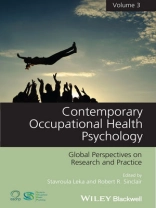The third volume in an acclaimed biennial series showcasing the latest global thinking, research, and practice in the rapidly-evolving field of occupational health psychology.
- Published in partnership with the European Academy for Occupational Health Psychology (EAOHP) and the Society for Occupational Health Psychology (SOHP)
- Presents state-of-the-art research along with its implications for real-world practice, with contributions from Europe, North America, Asia, and Australia
- Topics covered include psychological health during organizational restructuring, immigrant occupational health and well-being, increasing the effectiveness of safety training programs, and the WHO Healthy Workplaces Model
- Contributors include Fred Leong, Hans de Witte, Eva Demerouti and Sir Michael Marmot
Cuprins
About the Editors vii
Contributors viii
Preface xi
1 Social Determinants of Health and the Working-Age Population: Global Challenges and Priorities for Action 1
Angela Donkin, Matilda Allen, Jessica Allen, Ruth Bell, and Michael Marmot
2 An Explanatory Model of Job Insecurity and Innovative Work Behavior: Insights from Social Exchange and Threat Rigidity Theory 18
Wendy Niesen, Hans De Witte, and Adalgisa Battistelli
3 The Health Consequences of Organizational Injustice: Why Do They Exist and What Can Be Done? 35
Michael T. Ford and Jingyi Huang
4 Reconsidering the Daily Recovery Process: New Insights and Related Methodological Challenges 51
Despoina Xanthopoulou, Ana Isabel Sanz-Vergel, and Evangelia Demerouti
5 Psychological Reactivity: Implications for Occupational Health Psychology 68
Cynthia Mohr, Laurie Jacobs, Cameron Mc Cabe, and Lindsey Alley
6 Work–Family Balance and Well-Being among Japanese Dual-Earner Couples: A Spillover–Crossover Perspective 84
Akihito Shimazu, Kyoko Shimada, and Izumi Watai
7 A Life Course Perspective on Immigrant Occupational Health and Well-Being 97
Frederick T.L. Leong, Donald E. Eggerth, and Michael A. Flynn
8 Meaningfulness as a Resource to Mitigate Work Stress 114
Sharon Glazer, Malgorzata W. Kozusznik, Jacob H. Meyers, and Omar Ganai
9 Progress and Challenges in Occupational Health and Safety Research 131
Peter Y. Chen, Yiqiong Li, Michelle Tuckey, and Konstantin P. Cigularov
10 The WHO Healthy Workplace Model: Challenges and Opportunities 149
Evelyn Kortum
11 A Sound Change: Ways to Support Employees’ Well-Being during Organizational Restructuring 165
Krista Pahkin, Pauliina Mattila-Holappa, Karina Nielsen, Maria Widerszal-Bazyl, and Noortje Wiezer
12 Making Safety Training Stick 181
Autumn Krauss, Tristan Casey, and Peter Y. Chen
13 Sustainable Business Practice in a Norwegian Oil and Gas Company: Integrating Psychosocial Risk Management into the Company Management System 198
Linn Iren Vestly Bergh, Siri Hinna, and Stavroula Leka
14 An Analysis of the Coverage of Psychosocial Factors at Work in Corporate Social Responsibility Instruments and Standards 218
Aditya Jain, Daniel Ripa, and Juan Herrero
Index 241
Contents of Previous Volumes 249
Despre autor
Stavroula Leka is Associate Professor in Occupational Health Psychology at the University of Nottingham, UK; and Director of the Centre for Organizational Health & Development, a World Health Organization collaborating centre in occupational health. She is a Chartered Psychologist, Chair of the International Commission on Occupational Health’s Scientific Committee on Work Organization and Psychosocial Factors, and a member of the Executive Committee of the European Academy of Occupational Health Psychology. She is co-editor of Occupational Health Psychology (Wiley Blackwell, 2010) and of the two previous volumes of Contemporary Occupational Health Psychology.
Robert R. Sinclair is a Professor of Industrial-Organizational Psychology at Clemson University. Prior to coming to Clemson in 2008, he served as a faculty member at Portland State University from 2000-2008 and at the University of Tulsa from 1995-1999. He is a founding member and past president of the Society for Occupational Health Psychology. His research focuses on individual and organizational factors that contribute to workers occupational safety, health, and well-being with a particular focus on health care, military, retail, and educational settings.












